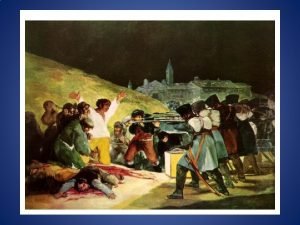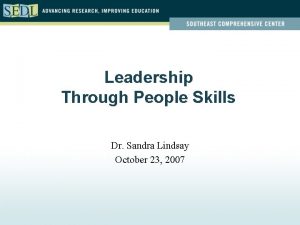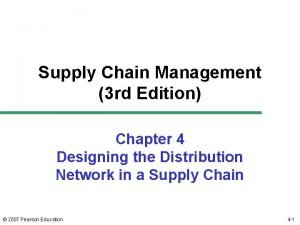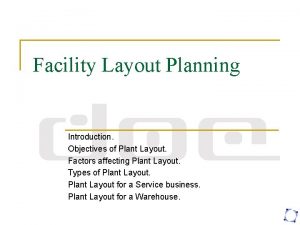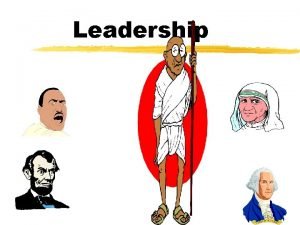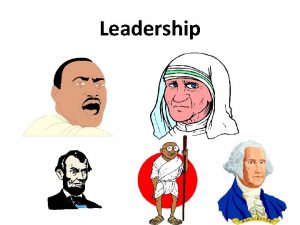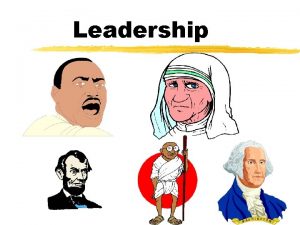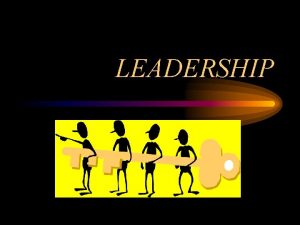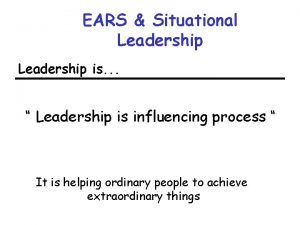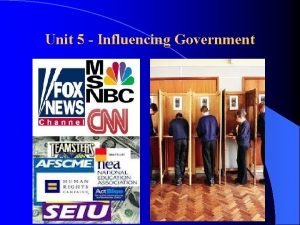What is leadership Leading people Influencing people Commanding





























- Slides: 29

What is leadership? Leading people Influencing people Commanding people Guiding people

2 Practices of successful leaders Do you demonstrate these qualities? D o y o e s u m e h et in s? r e oth 1. Challenge the process 2. Inspire a shared vision 3. Enable others to act 4. Model the way 5. Encourage the heart

Challenge the process 3 • Meet and overcome barriers • Never fear failure

Inspire a shared vision • Vision • Team goals • Enthusiasm 4

Enable others to act 5 • Shared decisions • Meaning • Coach and support • Trust and confidence

Model the way 6 • Set an example • Deeds match words • Little things = success

Encourage the heart 7 • Keep going when times are tough • Simple actions / dramatic gestures • Reinforce to motivate

Managers vs. Leaders Managers §Focus on things §Do things right §Plan §Organize §Direct §Control §Follows the rules Leaders §Focus on people §Do the right things §Inspire §Influence §Motivate §Build §Shape entities

Common Activities § Planning § Organizing § Directing § Controlling

Planning Manager §Planning §Budgeting §Sets targets §Establishes detailed steps §Allocates resources Leader §Devises strategy §Sets direction §Creates vision

Organizing Manager §Creates structure §Job descriptions §Staffing §Hierarchy §Delegates §Training Leader §Gets people on board for strategy §Communication §Networks

Directing Work Manager §Solves problems §Negotiates §Brings to consensus Leader §Empowers people §Cheerleader

Controlling Manager §Implements control systems § Performance measures §Identifies variances §Fixes variances Leader § Motivate §Inspire §Gives sense of accomplishment

Leadership Styles § Autocratic (Authoritarian) § Bureaucratic § Democratic § Coercive § Transactional § Transformational § Laissez-Faire

Who are Leaders? Autocratic

Who are Bureaucratic Leaders?

Who are Democratic Leaders?

Who are Coercive Leaders? You’re Fired!

Transactional leaders § Motivate followers by appealing to their own selfinterest § Motivate by the exchange process. § EX: business owners exchange status and wages for the work effort of the employee. § Focuses on the accomplishment of tasks & good worker relationships in exchange for desirable rewards. § Encourage leader to adapt their style and behavior to meet expectations of followers

When to use Transactional §Leader wants to be in control §When there approaching deadlines that must be met §Relationship is short term

Transformational leaders § Charismatic and visionary § Inspire followers to transcend their self-interest for the organization § Appeal to followers' ideals and values § Inspire followers to think about problems new or different ways in § Common strategies used to influence followers include vision and framing Research indicates that transformational leadership is more strongly correlated with lower turnover rates, higher productivity, and higher employee satisfaction.

Transformational cont. § Instils feelings of confidence, admiration and commitment § Stimulates followers intellectually, arousing them to develop new ways to think about problems. § Uses contingent rewards to positively reinforce desirable performances § Flexible and innovative.

When to use Transformational § When leaders want members to be an active part of the organization and have ownership to it § When leaders are building a sense of purpose § When the organization has a long term plan § When people need to be motivated

Laissez-Faire § Also known as the “hands-off¨ style § Little or no direction § Gives followers as much freedom as possible § All authority or power is given to the followers § Followers must determine goals, make decisions, and resolve problems on their own.

When to use Laissez-Faire § Employees are highly skilled, experienced, and educated § Employees have pride in their work and the drive to do it successfully on their own § Outside experts, such as staff specialists or consultants are being used § Employees are trustworthy and experienced

New Leader Traps §Not learning quickly §Isolation §Know-it-all §Keeping existing team §Taking on too much §Captured by wrong people §Successor syndrome

Manage Oneself §Be self-aware §Define your leadership style §Get advice and counsel § Advice is from expert to leader § Counsel is insight §Types of help § Technical § Political § Personal §Advisor traits § Competent § Trustworthy § Enhance your status

28 If you are willing to work harder, longer, and more intensely and beyond the call of duty, you will become an effective leader.

Questions 29
 It involves leading influencing
It involves leading influencing Bobbin leading and flyer leading
Bobbin leading and flyer leading Who painted liberty leading the people
Who painted liberty leading the people Who painted liberty leading the people
Who painted liberty leading the people Liberty leading the people 1830
Liberty leading the people 1830 Liberty leading the people, 1830
Liberty leading the people, 1830 Vincent ogé
Vincent ogé Liberty leading the people, 1830
Liberty leading the people, 1830 Transactional leadership vs transformational leadership
Transactional leadership vs transformational leadership Adaptive leadership style
Adaptive leadership style Enthusiastic beginner disillusioned learner
Enthusiastic beginner disillusioned learner Leadership is communicating people's worth
Leadership is communicating people's worth Leadership through people skills
Leadership through people skills Oxidation weathering
Oxidation weathering Factors influencing t&d
Factors influencing t&d Factors influencing faculty staff relationship
Factors influencing faculty staff relationship Factors influencing the choice of programming language
Factors influencing the choice of programming language Nursing definition
Nursing definition Factors influencing market segmentation
Factors influencing market segmentation Ib influencing business
Ib influencing business Conclusion of exceptional child
Conclusion of exceptional child Write the factors affecting oxygenation
Write the factors affecting oxygenation What are the factors influencing communication
What are the factors influencing communication Physical factors influencing agriculture
Physical factors influencing agriculture Principles of marketing quarter 2 -- module 7
Principles of marketing quarter 2 -- module 7 Factors influencing recruitment and selection
Factors influencing recruitment and selection Distributor storage with last mile delivery example
Distributor storage with last mile delivery example Factors affecting learning in psychology
Factors affecting learning in psychology Factors that influence consensus
Factors that influence consensus Objective of plant location
Objective of plant location


